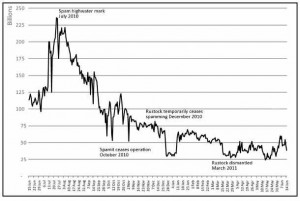 We have some great news for you: There was a whole lot less spam sent today than there was a year ago. A look at the graphic above puts it in visual terms for you, illustrating how there were more than 225 billion spam emails sent per day in July, 2010, and in June, 2011, that number has dropped to approximately 40 billion. That’s an 82.22% decrease in spam over a year.
We have some great news for you: There was a whole lot less spam sent today than there was a year ago. A look at the graphic above puts it in visual terms for you, illustrating how there were more than 225 billion spam emails sent per day in July, 2010, and in June, 2011, that number has dropped to approximately 40 billion. That’s an 82.22% decrease in spam over a year.
What heroes relieved us of much of this scourge? Security journalist and former Washington Post reporter Brian Krebs attributes some of the credit to cops and security experts with a lot of help from Internet service providers. The graph (provided by Symantec Intelligence) shows significant drops in spam levels occurred when investigators coordinated their efforts and brought down numerous major spam networks such as “Rustock,” said to be responsible for 40% of all junk email.
That was the good news. Now here’s the bad news: In the place of all those spam networks, there’s a new superbug emerging called TDL-4, and it’s smart enough to remove all the other malware from PCs as it takes over, replacing dozens of viruses with itself. It’s said to have already infected 4.5 million PCs, and according to Krebs, “it uses a custom encryption scheme that makes it difficult for security experts to analyze.”
What’s being done to stop this? In addition to their concerted efforts to stop the spammers, the good guys are following the money. Spammers are stealing hoards of money with click fraud, scareware and credential theft, so law enforcement agencies are going after the financial institutions that are handling the cash for these criminals. Good luck with that.
Meanwhile, we’ll stick with using Gmail, which uses crowdsourcing to do a highly effective job of filtering out spam. As a result, I haven’t seen a piece of email spam in months. While there are many other ways to encounter those creepy crawlies, using Gmail is the least we can do to protect ourselves.
What do you do to protect yourself from spam and malware?
Source : Mashable





































